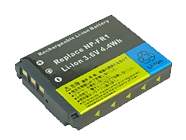| Replacement Camera Batteries › Replacement SONY Camera Batteries › Replacement DSC-T3 Battery |
Replacement Digital Camera Battery for SONY Compatible with SONY DSC-T3
If your original part number or laptop model is not included in the compatibility list, our battery may still fit your laptop. Please feel free to contact us at order@power-supplier.biz for confirmation.
|

Click to Enlarge
Special price: US $ 88.35
Tax Included |
|
| |
Product Details- Brand New, Three Years Warranty, Money-Back Guarantee
- Free shipping on all orders
- Processing time: Same day shipment
- Delivery time: 7 to 15 working days
- Location: China
- Product type: Compatible, Replacement
|
This Digital Camera Battery can replace the following part numbers:
SONY
NP-FR1,
This Digital Camera Battery is also compatible with the following models:
SONY
DSC-P120, DSC-T30/B, DSC-P100/LJ,
P200/R, DSC-T3, DSC-P100/S,
P200/B, DSC-F88, DSC-P200/R,
DSC-V3, DSC-P100/R, P200/S,
DSC-P200, |
| |
Battery Knowledge
- What is rechargeabel battery self discharge?
Primary battery or full charged secondary battery, when put aside for a period, it s capacity will decline or lose,this phenomenon calls self discharge that is electricity flee away.It is decided by the inner electro-chemistry system, similar to water leakage from pond or reservoir. - What is the ambient temperature affects the battery performance?
Low temperatures (e.g. -15oC) will obviously reduce Ni-Cd and Ni-MH battery discharge rate. At -20oC electrolyte is at its freezing point, charge speed will greatly slow down. At low temperature (under -15oC) charge will raise the internal gas pressure and probably unseal the safety vent. Ambient temperature of 5oC to 30oC is the best range to get effective charge. Generally with temperature rising charge efficiency will become higher. But when the temperature rises to 45oC or higher, the materials performance in the battery will be degenerated and battery service life will be shorten greatly. - How can rechargeable batteries be connected?
The rating for rechargeable battery NEW!! Battery Chemistry F.A.Q - Here we discuss different battery designs currently used, some of the chemistry involved, and advantages and disadvantages of each design. We have also included some useful definitions and a list of parameters to guide you in matching your battery requirements to a specific battery design.
|
Disclaimer
Our company provides products to certain computer manufacturers. Any reference to these manufacturers' products or trademarks is solely for the purpose of identifying computer manufacturers who may utilize our products. Our company and this website are not affiliated, authorized, licensed, distributed, or otherwise associated with these computer manufacturers in any way. The products sold through our website are not manufactured by, nor authorized for sale by, the computer manufacturers who use our products. Our products are designed to be compatible with, or serve as alternatives to, those manufactured by these companies. |
| |

